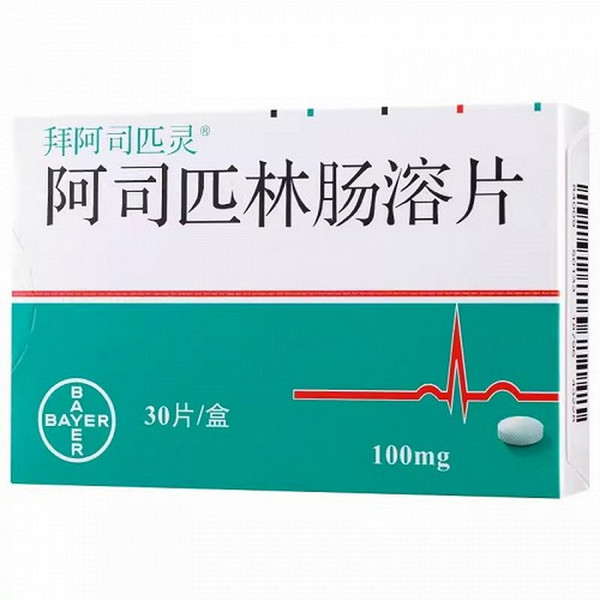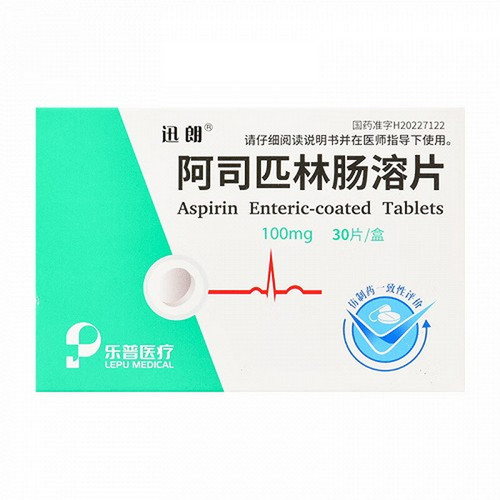Product Overview
Drug Name]
Generic Name: Enteric-Coated Aspirin Tablets
Trade Name: Bayaspirin
[Indications]
Inhibits platelet adhesion and aggregation in the following situations: unstable angina (heart pain caused by obstructed coronary blood flow); acute myocardial infarction; prevention of recurrent myocardial infarction; post-arterial surgery; post-arterial surgery or interventional procedures, such as aortocoronary bypass grafting (PTCA); prevention of transient ischemic attack (TIA) and prodromal symptoms, such as transient paralysis of facial or arm muscles or transient blindness, to prevent cerebral infarction.
[Dosage and Administration]
This product should be taken with warm water after meals and should not be taken on an empty stomach. For the treatment of acute myocardial infarction, the first tablet should be crushed or chewed before taking. After aortocoronary bypass grafting (ACVB), the optimal time to start using this product is 24 hours after surgery. Dosage and frequency: In unstable angina (heart pain caused by coronary blood obstruction), the daily dose of salicylic acid acetate is 75-300 mg, and the recommended daily dose of salicylic acid acetate is 100 mg (equivalent to 1 tablet per day); in acute myocardial infarction, the daily dose of salicylic acid acetate is 100-160 mg, and the recommended daily dose is 100 mg (equivalent to 1 tablet per day); to prevent recurrence of myocardial infarction, the recommended daily dose of salicylic acid acetate is 300 mg (equivalent to 3 tablets per day); after arterial vascular surgery (arterial surgery or interventional surgery, such as aortocoronary artery bypass grafting, PTCA), the daily dose of salicylic acid acetate is 100-300 mg, and the recommended daily dose is 100 mg (equivalent to 1 tablet per day); to prevent transient decreased blood flow to the brain (TIA: transient ischemic attack) and to prevent cerebral infarction after early symptoms have appeared, the daily dose of salicylic acid acetate is 30-300 mg. mg, with a recommended daily dose of 100 mg (equivalent to one tablet per day). Aspirin enteric-coated tablets should be used long-term, with the duration of use determined based on clinical circumstances.
[Adverse Reactions]
Common side effects include gastrointestinal reactions, such as abdominal pain and mild gastrointestinal bleeding, and occasionally nausea, vomiting, and diarrhea. Gastric bleeding and ulceration, as well as allergic reactions (dyspnea and skin reactions), primarily in asthmatic patients, are rare. Individual cases of liver and kidney dysfunction, hypoglycemia, and particularly severe skin lesions (erythema multiforme exudative) have been reported. Low doses of salicylic acid acetate can reduce uric acid excretion and may cause gout attacks in susceptible individuals. In rare cases, long-term use of aspirin enteric-coated tablets has led to anemia and melena (a symptom of severe gastric bleeding) due to occult gastrointestinal bleeding. Dizziness and tinnitus (particularly in children and the elderly) may indicate severe toxicity.
[Contraindications]
Allergy to acetylsalicylic acid and salicylic acid-containing substances; gastroduodenal ulcers; and bleeding tendency (hemorrhagic diathesis).
[Precautions]
This drug should not be used as an analgesic. Patients with asthma, hay fever rhinitis, or chronic respiratory infections (especially those with allergic symptoms), as well as those allergic to all types of analgesics, anti-inflammatory drugs, and antirheumatic drugs, may be at risk of asthma attacks (i.e., analgesic intolerance/analgesic-induced asthma) when using enteric-coated aspirin tablets. Long-term, high-dose use of enteric-coated aspirin tablets should be conducted under a physician's supervision. This drug should be used with caution in the following situations: hypersensitivity to other analgesics, anti-inflammatory drugs, or antirheumatic drugs, or other allergic reactions; concomitant use of anticoagulants (such as coumarin derivatives and heparin, with the exception of low-dose heparin therapy); bronchial asthma; chronic or recurrent gastroduodenal disease; renal impairment; or severe liver dysfunction. Avoid alcohol while taking this medication.
[Drug Interactions]
Aspirin potentiates and increases the effects of the following drugs: anticoagulants (such as coumarin derivatives, heparin); the risk of gastrointestinal bleeding caused by concomitant use of medications containing cortisone or cortisone analogs, or alcohol; certain hypoglycemic agents (sulfonylureas); methotrexate; digoxin, barbiturates, lithium; certain analgesics, anti-inflammatory drugs, and anti-rheumatic drugs (NSAIDs), as well as general anti-rheumatic drugs; certain antibiotics (sulfonamides and sulfonamide complexes such as sulfamethoxazole/trimethoprim); and triiodothyronine. Aspirin decreases the effects of the following drugs: certain diuretics (aldosterone antagonists such as spironolactone and canrenoic acid, loop diuretics such as furosemide); antihypertensive drugs; and uricosuric antigout drugs (such as probenecid and sulfinpyrazone).
[Pharmacological Actions]
Acetylsalicylic acid acetylates platelet cyclooxygenase (also known as prostaglandin synthase), thereby reducing thromboxane A2 (TXA2) production and irreversibly inhibiting TXA2-induced platelet aggregation. It also inhibits phase II aggregation induced by ADP or epinephrine. It can also inhibit platelet aggregation and release reactions induced by low concentrations of collagen, thrombin, antigen-antibody complexes, certain viruses, and bacteria, as well as spontaneous aggregation, thereby preventing thrombosis. At high concentrations, acetylsalicylic acid can also inhibit PG synthase in the blood vessel wall, reducing the synthesis of prostacyclin (PGI2). PGI2 is a physiological antimicrobial agent for TXA2, and its reduced synthesis may contribute to thrombosis.
[Storage] Store in a dry, airtight container away from light.
[Specification] 100mg x 30 tablets
[Expiry Date] 36 months
[Approval Number] National Medical Products Administration HJ20160685
[Manufacturer] Bayer Healthcare Co., Ltd.








